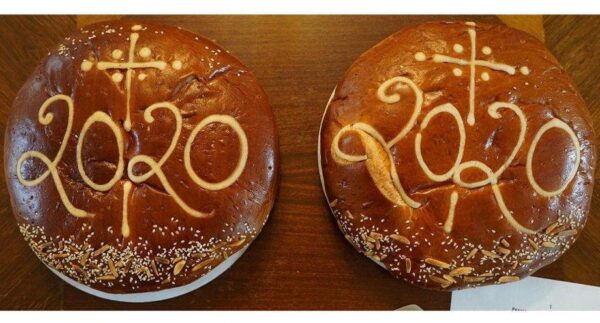It is a sweet, bread-like cake that is only made for the New Year celebration and is only eaten on New Year’s Day. Recipes for this cake differ depending on the family or the region of Greece, but in general, it involves flour, eggs, butter and sugar, and is usually finished with a sprinkle of confectioners’ sugar.
Vasilopita is a foremost Greek tradition for New Year’s Day. One of the most beautiful and inspirational traditions of the Greek Orthodox Church is the annual family celebration of the Vasilopita. The Greek word Vasilopita is directly translated as “Bread of Basil”. When the Vasilopita is prepared, a coin is baked into the ingredients. Sweet flavoring is added to the bread which symbolizes the sweetness and joy of life everlasting. It also symbolizes the hope that the New Year will be filled with the sweetness of life, liberty, health, and happiness for all who participate in the Vasilopita event.
The cake is cut by the senior member of the family, in a number of pieces corresponding to the number of those present as well as pieces for other members not present but close to the family or even pieces for the House, the Job, Jesus or Health . No one is allowed to look at their piece before everyone has received it to check it to see if they found the coin.
The type of coin varies. Some cakes have gold coins, others have smaller pieces of change. The type of coin doesn’t matter as much as the luck it brings if you find it in your piece.
Private or public institutions, such as societies, clubs, workplaces, companies typically cut their vasilopita sometime between New Year’s Day and the beginning of the Great Lent.
The history of vasilopita can be traced back to the ancient festivals of Kronia and Saturnalia and is connected to a legend of Saint Basil. It is said that he implored the citizens of Cesarea, the place where he was from, to raise money in order to halt a siege. Each citizen was to give whatever they had in the form of coins or jewellery. When the ransom was given to the invaders, those who organized the siege were so shamed by the collective generosity that they discontinued the siege. When Saint Basil attempted to return the valuables to the citizens of Caesarea, he discovered that there was no way to figure out how to distribute the donations back. To solve the problem, he baked the coins and jewellery into bread and then distributed the bread to the people.
In honor of Saint Basil, or Agios Vasilios, people bake this bread every year. The tradition has evolved from the original story and now whoever finds the coin is said to have good luck for the rest of the year. However, the bread itself does serve as a reminder for all that Agios Vasilios did for the people of Greece.




